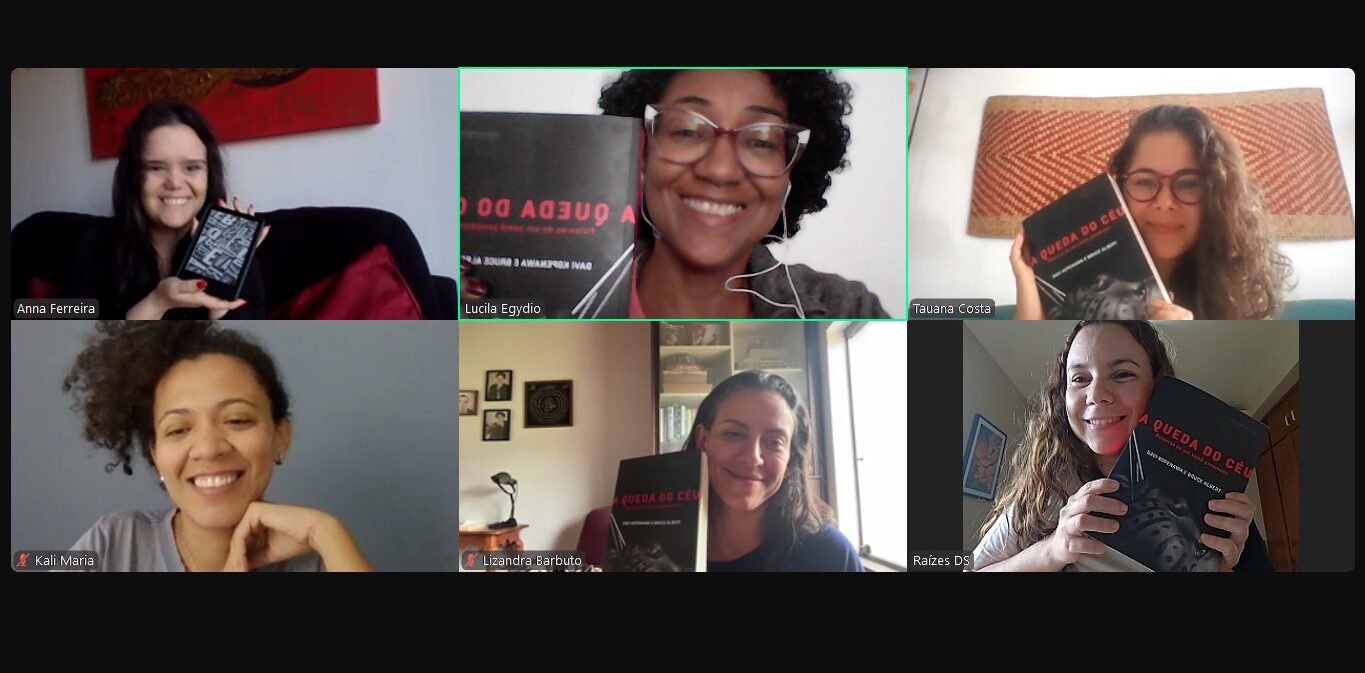
In our latest literary journey in the Raízes book club, we immersed ourselves in “The Falling Sky“, a work that transcends the pages to invite us to a profound reflection on life, spirituality and the intrinsic connection between beings and nature. Narrated by Davi Kopenawa Yanomami and written by Bruce Albert, the book is a living testimony to Yanomami ancestral wisdom and a warning about the devastating impacts of the invasion and destruction of their territories.
It took nine months of reading and meetings, in a process that required presence, sensitivity and a willingness to deal with the discomfort of not understanding everything immediately. The work provoked us to slow down, listen more carefully and let the words echo before trying to translate them with the filters of our Western gaze. It was a collective and transformative journey.
What did we discuss?
During our meetings, discussions emerged about the importance of demarcating indigenous lands and the ongoing struggle to preserve spaces that are both sacred and a source of life. We reflected on how orality, the guiding thread of ancestral knowledge, has been weakened by the pressures of the contemporary world and the logic of acceleration.
The loss of trust in listening and in the transmission of stories between generations echoed in us like a mirror. We realized how this also runs through us, even far from the forest – in our urban, academic and emotional contexts – where the time for meeting and caring for the word is so often lost.
Yanomami spirituality, deeply intertwined with the forest and all the beings that inhabit it, calls us to rethink our way of relating to the invisible, to time and to the sacred. Shamanic practices, rituals with the yãkoana and the presence of the xapiris reveal a living, complex and generous cosmology that challenges Western views and invites us to cultivate a more sensitive, committed and respectful listening.
As a group, we feel that this listening requires surrender. It requires a pause. It calls for letting go of certainties, for another time. And it reminds us that learning – really learning – is also about letting yourself be touched, being open to transformation and recognizing that there is knowledge that doesn’t fit in books, but in relationships.
Autonomy and resistance: the strength of the Yanomami people in the face of contemporary challenges
The club meetings were spaces for active listening and generous sharing. Powerful reflections emerged on the relationship between life, death and spirituality. One of the passages that most touched the group brought up the idea of refusing death and how attachment shapes our bonds, choices and ways of being in the world. It was an invitation to look inwards, at our own fears and the way we deal with the end of things, not only on the physical plane, but also in the cycles we end in everyday life.
We discussed the function of shamans and the role of shapiris as guides and healers, highlighting the delicacy and depth of the relationship between the visible and invisible worlds. The cosmology presented in the book led us to reflect on the commitment and responsibility involved in contact with ancestral knowledge.
The shamanic path, as narrated by Kopenawa, was perceived as a plunge into the shadows and also as a process of deep connection with the forest, the spirits and the collective. There was a sense of reverence, almost a call to slow down in order to really listen.
Living their own way: diversity, dignity and collective intelligence
We also talked about the Yanomami’s social organization and their quest for autonomy in the face of external interventions. The exchanges revealed how the indigenous people resist the imposition of structures that don’t dialogue with their realities and reaffirm their desire to live according to their own ways of being. The diversity between the villages, the languages spoken, the relationship with consumer goods and the territory were perceived as expressions of a collective intelligence that values plurality.
And we reflected on how this desire for autonomy is both a defense and an affirmation of dignity – a reminder that it is not enough to protect the forest: the knowledge and decisions of those who inhabit it must also be recognized.
At the end of this reading, we carry with us not only the knowledge we have acquired, but an internal transformation that drives us to act with greater awareness and responsibility.
Yanomami wisdom teaches us that taking care of the Earth is, above all, taking care of ourselves and future generations. Listening to what the sky and the forest have to say, even when the language escapes us, is a continuous exercise in presence and respect.




